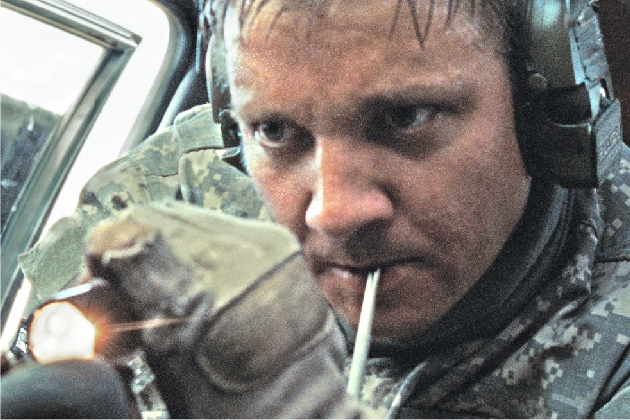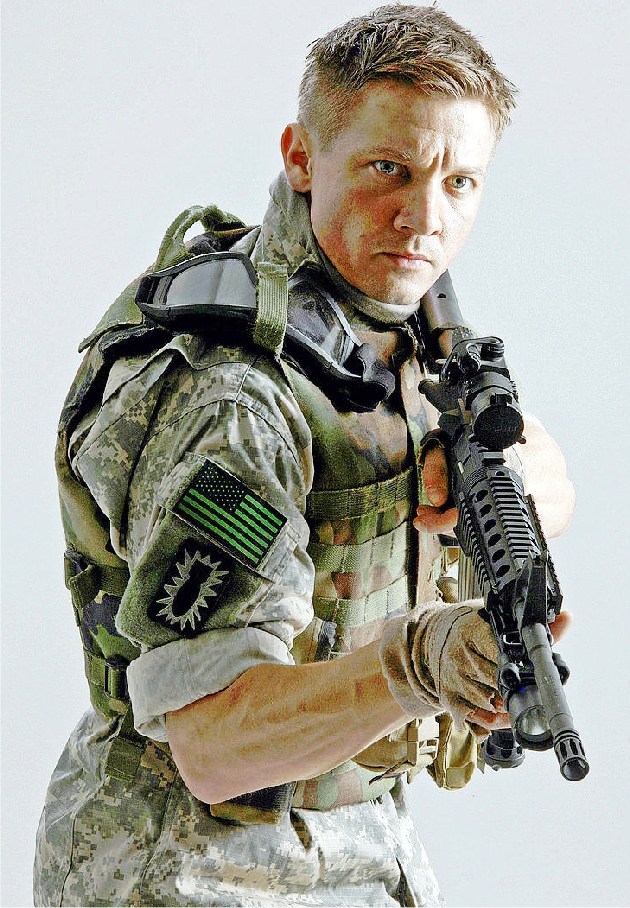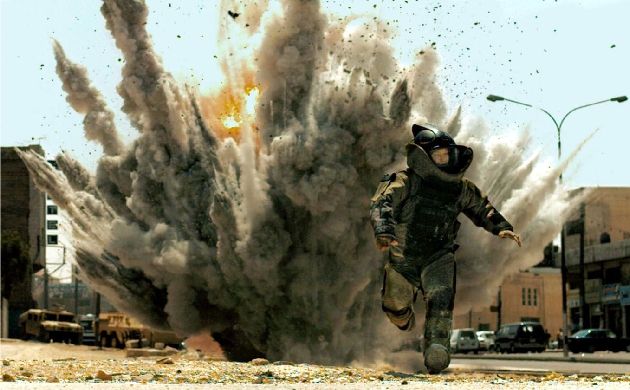The Shell Game of Corrupted Government Exposed
The Hurt Locker

For Love of Country or Love of the Rush?
Does it really matter? Staff Sergeant William James is still an American Hero -
 almost along the order of Audie Murphy. Sergeant Audie Murphy saved the lives of many American soldiers by killing hundreds of well armed Nazis. Staff Sergeant William James saved the lives of many American soldiers by dismantling hundreds of IED's in war torn urban Iraq.
almost along the order of Audie Murphy. Sergeant Audie Murphy saved the lives of many American soldiers by killing hundreds of well armed Nazis. Staff Sergeant William James saved the lives of many American soldiers by dismantling hundreds of IED's in war torn urban Iraq.
The Staff Sergeant, portrayed by virtually unknown actor Jeremy Renner, had just disarmed a very large bomb from a just burning automobile. It was a tough disarming: So tough, and dangerous, he took off his bomb suit, stating, "If I'm going to die, I'm going to die comfortable."
His squad-mate, Sergeant JT Sanborn, played by Anthony Mackie, agitated the Staff Sergeant, almost to the point of distraction, by incessantly radioing him while he was in the process of disarming an IED (improvised explosive device). After disarming the IED, the Staff Sergeant returned to the Humvee, turned off the radio and endeavored to relax. This earned him a punch to the face from Sgt. Sanborn.
As Staff Sergeant James sat in his Humvee, with his punched face; retaliation of any kind was far from consideration - once again just relieved to be alive - he was approached by a battle-clad Colonel Reed, played by David Morse, who knew well of the Staff Sergeant's prowess and celebrity:
Colonel Reed: "You the guy in the flaming car, Sergeant James?"
Staff Sergeant William James: "Afternoon, sir. Uh, yes, sir."
Colonel Reed: "Well, that's just hot shit. You're a wild man, you know that?"
Staff Sergeant William James: "Uh, yes, sir."
Colonel Reed: "He's a wild man. You know that? I want to shake your hand."
Staff Sergeant William James: "Thank you, sir."
Colonel Reed: "Yeah. How many bombs have you disarmed?"
Staff Sergeant William James: "Uh, I'm not quite sure."
Colonel Reed: "Sergeant?"
Staff Sergeant William James: "Yes, sir."
Colonel Reed: "I asked you a question."
Staff Sergeant William James: "Eight hundred seventy-three, sir."
Colonel Reed: "Eight hundred! And seventy-three. Eight hundred! And seventy-three."
Colonel Reed: "That's just hot shit. Eight hundred and seventy-three."
Staff Sergeant William James: "Counting today, sir, yes."
Colonel Reed: "That's gotta be a record. What's the best way to... go about disarming
; ; one of these things?"
Staff Sergeant William James: "The way you don't die, sir."
Colonel Reed: "That's a good one. That's spoken like a wild man. That's good."
 Staff Sergeant William James, played by Jeremy Renner, disarming a big bomb: Above. The Staff Sergeant earning a bit of a break in his Humvee after disarming the bomb, and just before Sergeant Sergeant JT Sanborn, played by Anthony Mackie, belts him for his trouble: Below.
Staff Sergeant William James, played by Jeremy Renner, disarming a big bomb: Above. The Staff Sergeant earning a bit of a break in his Humvee after disarming the bomb, and just before Sergeant Sergeant JT Sanborn, played by Anthony Mackie, belts him for his trouble: Below.

That was the Staff Sergeant's life: danger, notoriety, a punch in the face. And yet, he was the perfect soldier. A throwback to the days of Roman Centurions; when some men led simply because they stayed alive; a result of remaining the toughest, smartest and bravest of a lot, whose very existence for these career soldiers' lives was predicated upon excellence or else (think decimation).
This is what I took from this film about an unpopular war that American soldiers are forced to fight, and fight well. The Staff Sergeant exhibited what is best within a career soldier: loyalty, cognitive awareness, bravery. He also manifested an emotional need to be where the action was, and consequently, he suffered from bouts of emotional detachment from those who were closest to him. Probably earned him another punch in the face from time to time.
 The Staff Sergeant takes a break from disarming IED's to do some conventional soldiering: Above and below.
The Staff Sergeant takes a break from disarming IED's to do some conventional soldiering: Above and below.

Director Kathryn Bigelow, who won the Oscar for Best Directory (one of the film's 6 Oscar wins), employed the Mark Boal Screenplay, who won one of those Oscars for Screenplay Written Directly for the Screen, to project these range of emotions on the screen for the protagonist, Staff Sergeant William James, and those that lived and fought with him in Iraq, and those that could not live him back in the states - his family. His fear to commitment was an insurmountable challenge for a man who had become exactly what the aforementioned Colonel Reed had accurately depicted in his comment, "You're a wild man, you know that?"
Its not that film obsesses about Staff Sergeant James, its just that he is the orb with the gravitational pull that forces everyman in his unit to orbit around him. And at that point, one could surmise that he is "a wild man," who needs the adrenalin rush of danger in battle to give him the fullness of
 life that he craves. Some will see him as an anti-team-member; that his selfish obsession with the literal fog of battle, and that jeopardizes the safety of the members of his unit. For me, I see the Staff Sergeant an efficient and brave soldier, who makes the men in his unit more efficient, more brave as well, regardless of whether they naturally gravitate toward that mode of operation.
life that he craves. Some will see him as an anti-team-member; that his selfish obsession with the literal fog of battle, and that jeopardizes the safety of the members of his unit. For me, I see the Staff Sergeant an efficient and brave soldier, who makes the men in his unit more efficient, more brave as well, regardless of whether they naturally gravitate toward that mode of operation.
That is mark of a very good film: To allow each to arrive at our separate opinions, without preaching how we should interpret it, in its 131 minutes of runtime. I interpret the film as one that represents the hell that is total war, and how men must react and become the soldiers that is their ability to become, and the effects that transition has upon their very souls.

I read that the undiagnosed post traumatic stress that afflicted Audie Murphy affected him greatly until his untimely demise from a plane crash in 1971. My own father, who fought in the pacific theater of WW II, never slept well. I suspect Staff Sergeant William James, whose story was based on real soldiers from the Iraq theater in the War on Terror, will also suffer from the remembrances of war. This is the sacrifice that our heroes suffer. We owe them our total gratitude.
This is what I took from this film. Like most very goods films, it made its point well
Rated R. Released on DVD January 10, 2010.
This article provided courtesy of our sister site: Better Angels Now






















